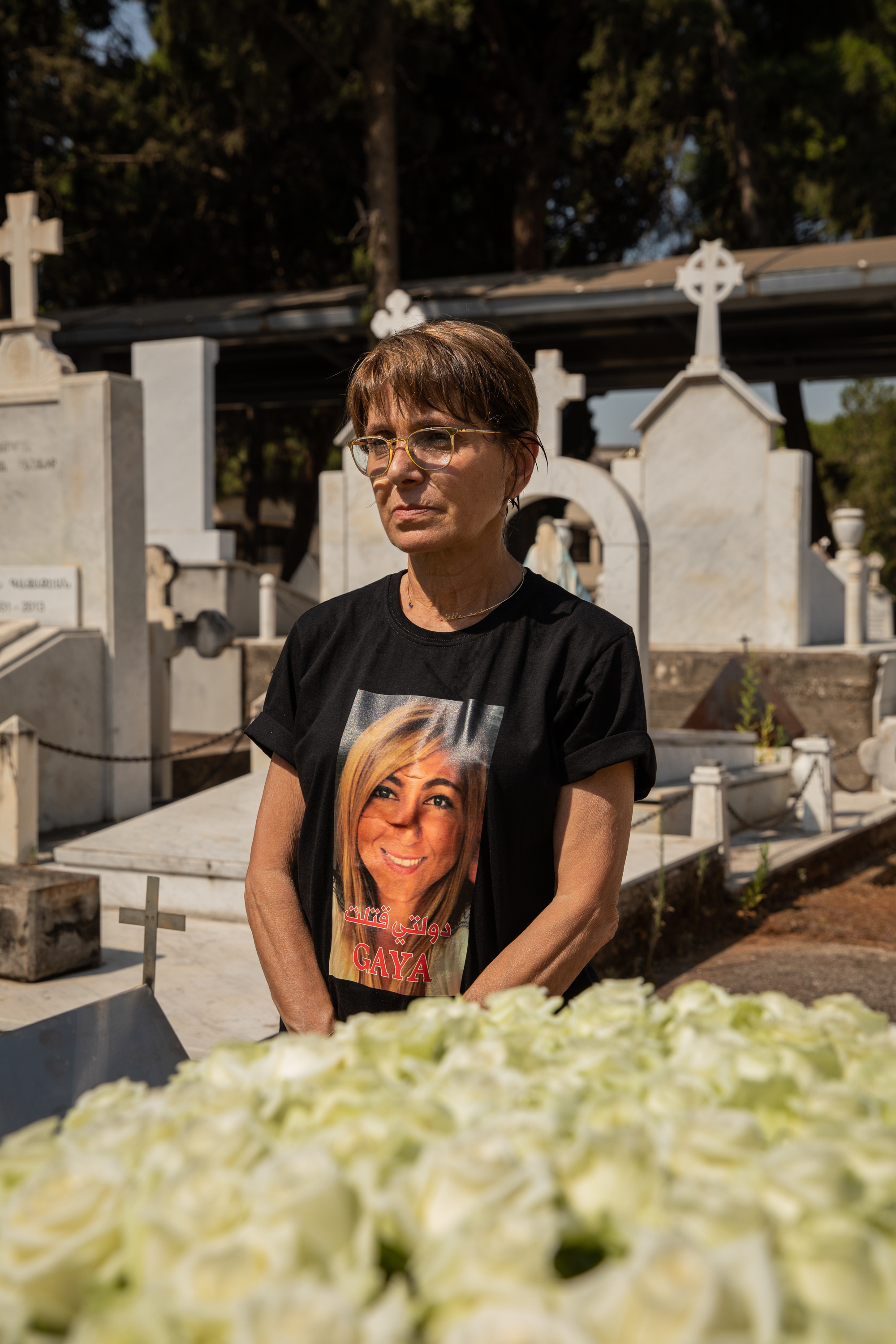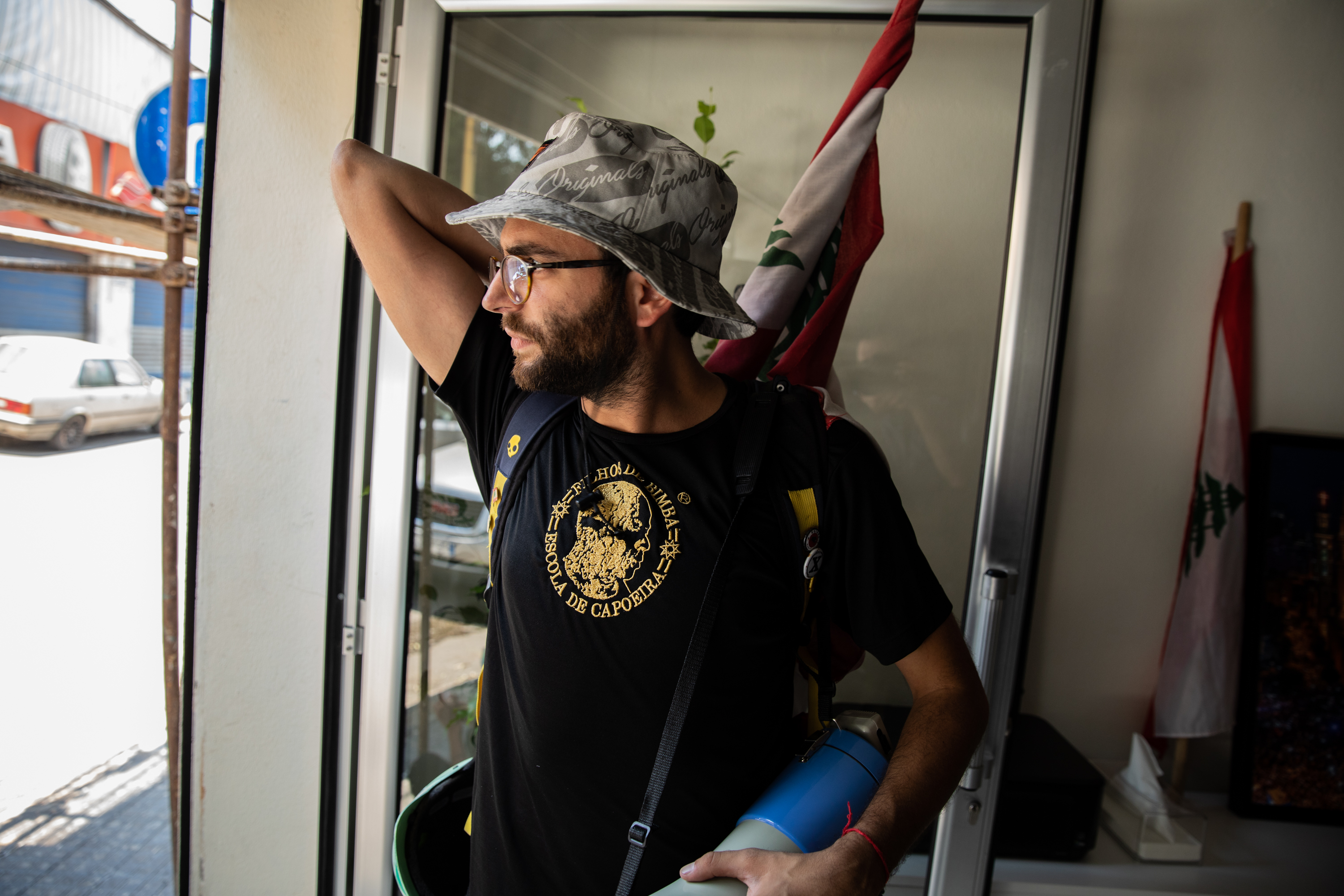BEIRUT – “She’s not a martyr, she’s a victim. She was living her life normally and she didn’t want to die.”
Annie Vartivarian stands alone in front of her daughter’s grave as the already-unbearable Lebanese sun bears down on her. Old men who tend the graves at the Armenian Cemetery in Beirut have taken refuge in the shade and lazily chat among themselves. Water droplets glisten on the petals of the white roses which surround the headstone.
Videos by VICE

It is a quiet morning in Beirut, the streets are uncharacteristically empty, and yet there is a tension in the air. It is exactly one year since the explosion at the city’s port, when 2,750 tonnes of improperly-stored ammonium nitrate caught fire and exploded, killing at least 218 people, leaving thousands injured, and destroying and damaging buildings across the capital.
A year ago, Vartivarian’s daughter, Gaya Fodoulian, ran towards their kitchen to take shelter. Vartivarian ran the opposite way towards the sitting room. Gaya later died of a brain haemorrhage.

Today, Vartivarian wears a black T-shirt with a photo of Gaya printed on it and lights incense and candles as she remembers her daughter on the one-year anniversary of her death. Gaya’s sister Mariana Fodoulian has accompanied her mother to the grave this morning. Fodoulian is on the committee of the families of the victims of the explosion and has played a role in organising a march from the Palace of Justice in Beirut to a memorial service to be held in the port. She too wears a T-shirt with Gaya’s photo on it and silently prays to herself.
So far, investigations into what exactly happened that day has revealed very little. Attempts to provide accountability have been hampered by resignations, refusals to cooperate, claims of parliamentary immunity and even murder. Last week saw the resignation of former Prime Minister, Saad Hariri, and the appointment of billionaire businessman, Najib Mikati, as the new Prime Minister Designate. Nabih Berri, the head of the Shia Amal party and speaker of parliament, has called for parliamentary immunity to be lifted on those under investigation.
“The investigation has moved. I’m sure the judge has everything but probably there are pressures and there are threats,” Vartivarian tells VICE World News. “When you live through the civil war in Lebanon you know the way things go, the dealings of the politicians, it’s very normal for me.”
For Vartivarian, sadness is always there, but this day is about remembering her daughter and marching in solidarity with others who lost their loved ones.
A mile and a half away in the Mar Mikhael neighbourhood of Christian East Beirut, the political activist Sam el Khoury is readying himself for the day ahead. With the nervous energy of a man who is used to violent flare-ups during protests, he lays his gear out on the table in front of him.

“It’s mixed feelings you know. At some point you get angry and then you get a bit emotional,” El Khoury says as he checks his gas mask. “Last year I should have died. I was very close to the blast. It’s not easy.”
El Khoury’s office is only a few hundred metres from the blast epicentre. Today the lights are off and there is a nervous energy in the air. El Khoury and his fellow activists are old hands at protesting in a country that has been described as on the verge of collapse for over a year now. Lebanon’s economy continues to be in freefall. Half the population is living below the poverty line and the local currency, which is pegged to the dollar, has lost more than 90 percent of its value. The descent into the abyss seems never ending.
Despite the simmering tension, El Khoury and his friends laugh and eat manousheh, the Lebanese breakfast staple, as they hand out gloves and eye masks amongst themselves.

The plan is to start the march in nearby Sassine Square before passing by the hospitals that were destroyed by the blast, onto the fire brigade headquarters and then ending in the port.
“It’s very important to be present on the ground and to show the anger of the people. To show the rotten system how we feel.”

Another activist who shares this point of view is 20-year-old Lara Moukahal. In the neighbouring area of Geitawi, Moukahal is holding a meeting with her friends and fellow activists as they prepare for the day ahead.
They joke and smoke cigarettes as they check out each other’s gear. Full face masks emblazoned with flames, long homemade potato cannons and even a small can of pepper spray. Like Vartivarian and El Khoury, Moukahal is marching in solidarity with those who lost loved ones a year ago and to show the government her anger. However, things in Lebanon can turn quickly and Moukahal is a big believer that it is better to have the right gear and not need it, than need it and not have it.

Despite her age, Moukahal is a seasoned protester. In fact, she makes a point of being at every march or meeting she can get to between her shifts in a department store. When friends of hers were arrested for protesting and charged with terrorism, she sat outside the court in solidarity every day for a week.
“Lebanon has stolen my youth,” Moukahal says while watching her friends.
Moukahal and her friends are joining the march from Sassine Square which will weave through the areas close to the port before splitting off and heading to Martyr’s Square close to the Lebanese Parliament.
At 3pm VICE World News meets Vartivarian outside the Courts of Justice in Beirut as the families of those who died voice their anger before marching through Beirut. The sun is even more merciless at this time but despite the heat those gathered are dressed in black and carry photos of their loved ones with them as they walk. Fathers and mothers weep silently and hold hands. The atmosphere is sombre but one of defiance. Vartivarian walks among a group of mothers as this river of mourning slowly courses through the city.

Joining the families are both the Beirut Bar Association of lawyers and the Tripoli Bar Association dressed in their full court robes. These lawyers are striving to find answers just as much as the families are and tempers flare as the path of the families is blocked by the army. One lawyer is forced to pull a father away from the metal gate he has picked up and thrown onto the razor wire barricade erected by the army.
As the afternoon wears on and 6:08PM – the exact time of the explosion a year ago – draws near, all the different marches converge onto the highway which runs parallel to the port. The turnout is huge, and a sea of red and white Lebanese flags shields any tarmac from view. The air is electric, and the revolutionary songs being blasted at full volume bounce off the nearby high-rise buildings still not yet repaired from the blast.
El Khoury and his friends run past to attend a vigil held near the Lebanese Emigrant statue which looks over the port as Vartivarian descends a small hill leading to the official entry to the port.

Under the shadow of the destroyed grain silos at the heart of the explosion, a memorial service is about to get under way for the families of those that died tragically a year ago. Entry is for family and friends only. However, in a rare lifting of security measures, press have been granted access to the centre of the port, but this means an arduous process of obtaining permissions from the Lebanese Army, the General Security, two high ranking military officials and Father Tony, one of the priests responsible for the service.
Vartivarian sits on one of the plastic chairs laid out not far from a destroyed cargo ship as the service gets underway and the names on the official list of the dead are read out. An orthodox priest walks amongst the families offering condolences and kissing weeping loved ones on the head.
As the service continues, reports come in of heavy amounts of tear gas being deployed by the army and Internal Security Forces (ISF) to keep protesters back from Parliament. In a bid to avoid this, the ISF have covered the downtown area of Beirut in a cloud of tear gas.

The effects of the gas can be felt hundreds of metres away as Moukahal and her friends draw close to Martyr’s Square and the Parliament. Last year’s shipment of military grade tear gas manufactured in France is being used with excessive force.
Not since the 8th of August 2020, which saw tens of thousands of people pour into the streets surrounding the parliament in violent anger four days after the blast, has there been this many people attacking government buildings. The anger has been amplified by a Human Rights Watch investigation, released on the eve of the anniversary which implicates senior Lebanese officials in the explosion a year ago. Protesters believe these political and security figures are responsible for what happened to their city and loved ones but are exasperated by the lack of accountability. This frustration has morphed from shouts and marches aimed at the political establishment to bricks and fireworks aimed at the security services.
As the tear gas cloud engulfs innocent protesters, Moukahal and El Khoury are lost in the melee. Men emerge from the haze carrying women who have passed out due to the inhalation and women appear helping men hobble away from the effects of the rubber bullets fired by the riot police. Any exposed skin starts to burn, and young demonstrators pour water into their eyes and sniff raw onion to mitigate the effects of the gas.

Like the ebb and flow of a tide, protesters charge at Parliament launching fireworks and debris, only to be pushed back by the barrage of tear gas and rubber bullets. A young man hides behind a wooden shield while showing VICE World News the rubber bullet that just bounced off the kerb next to him.
As evening descends and the army sends protesters scurrying home with a final volley of gas, El Khoury is found standing alone near the square casting a final glance over the day’s events.
Wild eyed, El Khoury catches his breath and mops his brow while keeping a look out for the Army. He says what justice will look like for him.
“All of them dead. All the politicians hanged. These people have been killing the country and exploiting the people for over fifty years. It’s about time.”
For Vartivarian it is another restless night’s sleep in the hills of Beit Mery, five miles outside of Beirut. The heat and the memories keep her up and she can’t stay in the city for long anymore. Like El Khoury, she wants justice, but she wants it for her daughter and nothing else.
“Her soul will only rest when justice comes. Only then will we be calm,” she said.




